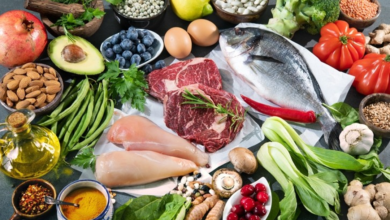7 Impressive Health Benefits of Pineapple

Pineapple contains nutrients and beneficial compounds, such as vitamin C, manganese, and enzymes, to help aid digestion. Eating pineapple may help boost immunity, lower cancer risk, and improve recovery time after surgery.
Pineapple (Ananas comosus) is a tropical fruit. It contains nutrients, antioxidants, and other compounds, such as enzymes that can protect against inflammation and disease. It’s commonly eaten baked, grilled, or freshly cut.
Pineapple and its compounds are linked to several health benefits, including improvements in digestion, immunity, and recovery from surgery.
Nutritious Facts
They are low in calories (kcal) but highly nutritious. Just 1 cup (165 grams) of pineapple chunks contains the following:
- Calories: 82.5 kcal
- Fat: 0.198 grams (g)
- Protein: 0.891 g
- Carbs: 21.6 g
- Fiber: 2.31 g
- Vitamin C: 78.9 milligrams (mg), 88% of the Daily Value (DV)
- Manganese: 1.53 mg or 109% of the DV (for women) and 2.3mg or 66% of the DV (for men)
- Vitamin B6: 0.185 mg, 11% of the DV
- Copper: 0.181 mg, 20% of the DV
- Thiamine: 0.13 mg, 11% of the DV
- Folate: 29.7 micrograms (mcg), 7% of the DV
- Potassium: 180 mg, 4% of the DV
- Magnesium: 19.8 mg, 5% of the DV
- Niacin: 0.825 mg, 5% of the DV
- Pantothenic acid: 0.351 mg, 7% of the DV
- Riboflavin: 0.053 mg, 4% of the DV
- Iron: 0.478 mg, 3% of the DV
It also contain trace amounts of phosphorus, zinc, calcium, and vitamins A and K.
Interesting Facts About Pineapple
Pineapple is good for your overall health, but what makes this fruit healthy is what we will come to in this article. However, here are some interesting facts that you need to know about this healthy fruit.
- It is derived from the Spanish word pina meaning pine cone that was used in 1398. 300 years later it was called pineapple in order to identify the fruit individually.
- It was discovered on the island of Guadalupe in 1493 by Europeans.
- It was treated as a luxurious fruit because of the sort of prestige that it had.
- The skin is used to make alcohol, animal food and vinegar.
7 Impressive Health Benefits are:
Contains antioxidants
They are not only rich in nutrients, but they also contain antioxidants — molecules that help your body ward off oxidative stress.
Oxidative stress is caused by an abundance of free radicals, unstable molecules that cause cell damage often linked to chronic inflammation, weakened immune health, heart disease, diabetes, and some cancers.
They are especially rich in antioxidants called flavonoids and phenolic compounds. Trusted Source showed that pineapple’s antioxidants may have heart-protective effects, though human research is lacking.
Moreover, many of the antioxidants in it are considered bound antioxidants, producing longer-lasting effects.
Good for Digestion
They are the only known food source of bromelain, a combination of enzymes that digest protein. That’s why they work as a meat tenderizer: The bromelain breaks down the protein and softens the meat. In your body, bromelain makes it easier for you to digest food and absorb it.
Strengthen Bones
Pineapple is rich in manganese that helps in strengthening your bones. All you need to do is to add this fruit to your everyday diet and this will help you maintain a strong body and keep your bones strong and healthy. Manganese maintains good bone strength and when it is combined with zinc, copper and calcium this substance can be super healthy. Thus, it has all the components and this is why this fruit can aid in stronger bones.
Prevents Cancer:
A pineapple a day can keep cancer away and this is true in the case of this healthy fruit. All you need to do drink its juice every day and reap the benefits of it. The best thing about this fruit is that it slows down cell damage and makes you look younger. This fruit has loads of antioxidants in it that can protect you from a wide range of diseases and fights some dangerous organisms that are may affect you.
May support the cardiovascular system
Once again, it is bromelain that appears to have value to the heart and circulatory system through its action on preventing or minimising the severity of attacks of angina and transient ischaemic attack (TIA). It’s also thought that bromelain may break down the cholesterol plaques, responsible for hardening of the arteries which may lead to a condition called atherosclerosis.
Animal studies suggest bromelain also influences blood clotting by inhibiting the production of a protein called fibrin which is involved in blood coagulation.
Pineapple’s Nutrient Profile Means the Fruit Can Help Boost Immunity
You may want to reach for pineapple the next time you’re battling a cold. One study found that children who consumed canned pineapple had fewer viral and bacterial infections compared to children who did not consume it over the nine-week study period. The researchers concluded that eating one to two cans (140 to 280 grams) daily may reduce the likelihood of an infection or at least shorten its duration.
May speed recovery after surgery or strenuous exercise
Eating pineapple may reduce the time it takes to recover from surgery or exercise.
While this fruit helps replenish carb stores after exercise, some of its benefits are also due to the anti-inflammatory properties of bromelain.
Several studies have shown that bromelain may reduce the inflammation, swelling, bruising, and pain that often occur after surgery, including dental and skin procedures. It may likewise reduce markers of inflammation.
It may even reduce discomfort, pain, or swelling after dental surgery.
Bromelain may also speed muscle recovery after strenuous exercise by reducing inflammation around the damaged muscle tissue.
5 Easy ways to add pineapple to your diet
In terms of Asian-style cuisine, here are some common ways to prepare pineapples:
- Pineapple fried rice: This dish is a popular street food in Southeast Asia and is made by stir-frying rice with pineapple, vegetables, and meat.
- Pineapple curry: This sweet and spicy dish combines diced pineapple with spices and vegetables to create a flavourful and hearty meal. Use coconut milk sparingly if needed!
- Pineapple salad: This fresh and crunchy salad combines with herbs, vegetables, and a tangy dressing.
- Pineapple skewers: This simple and delicious snack is made by grilling or roasting diced pineapple on a skewer.
- Pineapple smoothie: This refreshing and healthy drink combines fresh pineapple with milk, yogurt, or ice cream to create a sweet and creamy smoothie.
Is pineapple safe for everyone?
Unless you experience an allergy it is generally recognised as safe for most people when included as part of a healthy, balanced diet. However, eating or drinking large quantities may cause digestive upset. Avoid the unripe fruit as this can cause diarrhoea and throat irritation.
Also read: https://www.healthevoke.com/8-incredible-health-benefits-of-honey/












One Comment